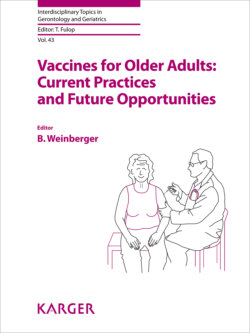Читать книгу Vaccines for Older Adults: Current Practices and Future Opportunities - Группа авторов - Страница 25
На сайте Литреса книга снята с продажи.
Impaired Mer Signaling
ОглавлениеTAM receptors (Tyro3, Axl, and Mer) are a family of receptor tyrosine kinases that play critical roles in tissue homeostasis by recognizing and inducing phagocytosis of apoptotic cells. TAMs are also negative regulators of TLR-mediated immune responses that broadly inhibit both TLR and TLR-induced cytokine receptor cascades to limit inflammation [84]. The importance of TAMs in immune activation is illustrated by the observation that reduced levels of TAMs in humans and in a TAM-deficient mouse model are associated with susceptibility to autoimmune disease and higher or chronic inflammation [85–87]. Monocytes from older donors showed elevated expression of TAM receptors but impaired activation of the Mer pathway following binding of the ligand Protein S, leading to impaired signaling through AKT [88]. The elevated expression of TAM receptors in monocytes from older adults has important implications for dysregulation of immune responses in aging, in particular as the Mer pathway is critical for clearance of apoptotic cells that contribute to inflammation in aging [89, 90]. Defective TAM signaling in alveolar macrophages in old mice may also explain impaired phagocytic clearance of apoptotic PMNs and increased mortality during influenza infection [91]. Further, TAMs play a key role in mediating autophagy [84, 85], and the reduced efficiency of autophagy in aging has been shown to contribute to accumulation of damaged proteins in cells [92]. The importance of TAMs in aging may be especially significant in tissue, where levels of Mer are highest, and may present avenues for modulation of chronic tissue inflammation noted in aging.
